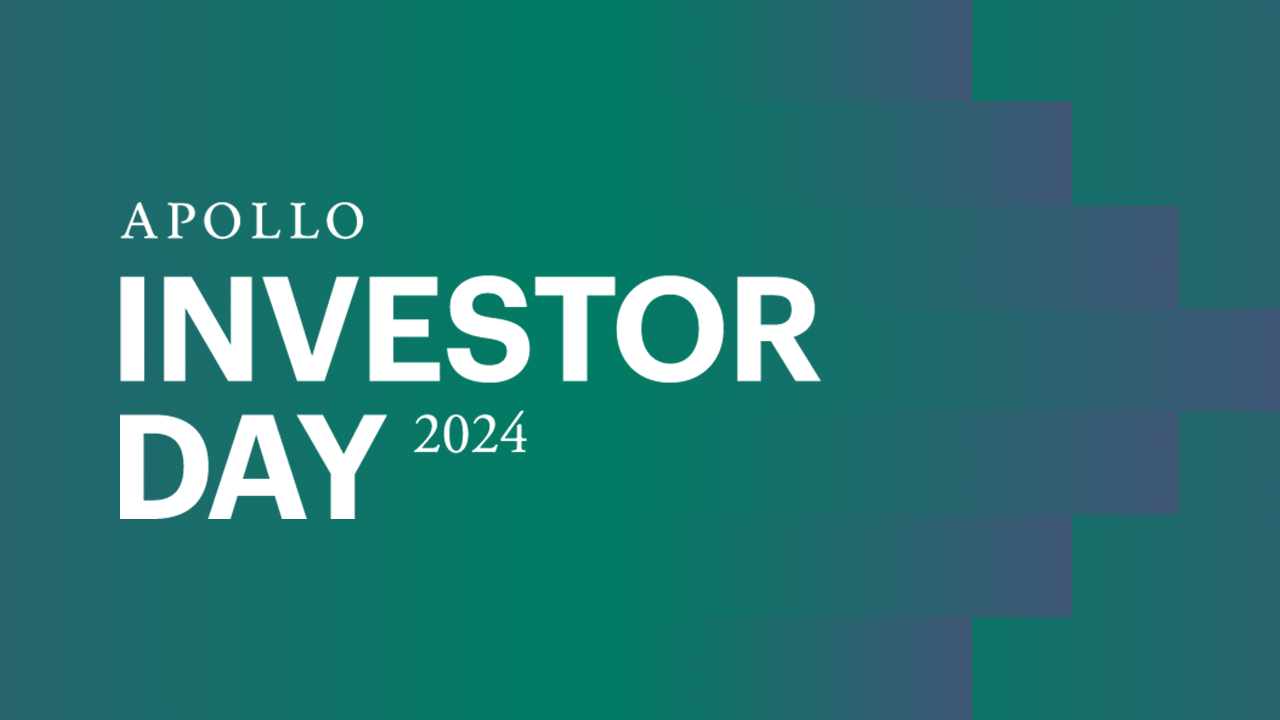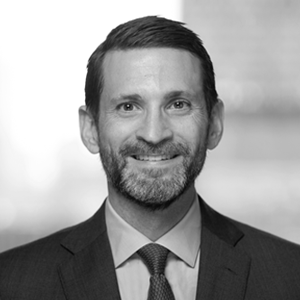September 23, 2024
Matthew Michelini on Bloomberg TV
This interview originally aired on Bloomberg TV on September 11, 2024.
Head of Asia Pacific Matthew Michelini joined Bloomberg TV to discuss the momentum of Apollo’s Asia-Pacific business and opportunities we see to capitalize on the strong and growing demand for guaranteed income and customized capital solutions.
-
Summary
-
Transcript
- Summary
- Transcript
Watch the video to hear Matthew Michelini speak to the firm’s focus on fixed income replacement and equity replacement, as well as the potential benefits alternatives can provide both institutional and individual portfolios amid heightened volatility. He also noted increased demand for private capital financing among Japanese corporations, as they seek long-duration, flexible funding to match their capital expenditure needs.
Shery Ahn, Bloomberg TV Anchor & Correspondent: Let's talk about one firm who is investing heavily here in Asia. Apollo seeing the revamp of its Asia business paying off as the alternative asset manager continues its expansion in the region. The company is looking to lure capital from insurers and institutions that handle money for retirees in the region, including, of course, Japan and Australia. Joining us now is Matt Michelini, head of Asia Pacific at Apollo.
Matt, great to have you with us finally.
Matthew Michelini, Head of Asia Pacific at Apollo: Thanks for having me. Great studio.
Shery Ahn: Great. Thank you very much. It's a whole new studio that has been in place for two months or so. But tell us a little bit about your drive here in Asia, because I think in April you guys said that you raised about $35 billion. You have an updated figure or how much of that comes from Japan maybe?
Matthew Michelini: Yeah. So I don't have an updated figure for you. However, the capital raising part of our business is going very well in Asia. The global wealth business, which is basically distributing our product to average savers, is going really, really well in Hong Kong, Singapore, now Australia, Korea, Japan. So that continues to go quite well. The insurance business is better than ever.
The demand for guaranteed income by everybody--insurance companies, pension plans, sovereign wealth funds, individuals--is really going through the roof. And so that business has been going quite nicely. And it's really driven by the demand for a replacement for public fixed income and replacement for public equity. You know, both of those asset classes have played an important role in traditional portfolios.
That role has changed. We all know that that role has changed. We all know that those markets have become beta markets. And so, as investors demands and needs are changing, especially as they start to retire, they need an alternative to those markets and that's when they come to us.
Shery Ahn: Is there a shift in perception when it comes to private markets? Because we have seen incredible volatility when it comes to even the yen carry trades being unwound. And just take a look at the Japanese markets right now, up and down, up and down.
Matthew Michelini: And you raise a great point. I mean, stepping back, to alternatives, alternatives used to be defined as risky stuff. Private equity, venture capital, hedge funds. And then you had some macro bets like real estate and infrastructure. But as you've had capital provided not by the banks anymore, but by the private markets in the U.S., and you're also going to now see that in a major way, I think, come to Europe, you now, all of a sudden, have the challenge.
We've challenged the notion of alternative as being private being risky and public being safe. You now have safe privates, risky privates, safe publics, risky publics. And so, yes, what investors want is they want what the banks have had access to for 20 years. They want the nice, safe, consistent yield with very low loss ratios underwritten on a fundamental basis, not mark to market, not subject to the gyrations of the market or the yen carry trade or unwind of leverage can cause extreme volatility in portfolios. That's absolutely what investors are looking for.
Shery Ahn: And when I was speaking to Marc Rowan just a few years ago, he was so optimistic about the Japanese market, but that was even before inflation had properly set in. Has the appetite sort of changed, especially now when people are thinking you actually need to guarantee some income into retirement?
Matthew Michelini: Yes. Well, Marc's crystal ball is uniquely very good. So maybe he knew. Maybe he knew… Look, I think that the increase in inflation and increase in rates has been a major boom for our business in Japan. On the investing side. If you think about it, money's been free for essentially 30 years. And so, you know, if the ice cream shop is giving away free money, you'll accept vanilla.
But as money starts to cost something. And as the Tokyo Stock Exchange has required companies to really look at their balance sheet and ask themselves, are you being efficient with shareholder money? You know, they first turned to the traditional tools: dividends, buybacks, sell a company. Sell a company plays right into our private equity strategy and we've been quite successful here having just recently bought a division from Panasonic.
But then you start getting companies asking the question today as well, “If I'm going to pay for my money and I can't just easily roll it over with bank funding, should I pay a little more for duration? Should I pay a little more for flexibility? Should I pay a little more for something that is better rated on my balance sheet?”
And these questions are starting to get asked by Japanese corporates. And so, I think that the tools that exist all across the world and the tools that existed 30 years ago, it's just been on the shelf. Well, money's been free, the tools have been on the shelf. They're starting to come off the shelf and Japanese corporates are asking.
Shery Ahn: So you don't see yourself as a competition to banks? Because, I mean, they really want to attract their customers here in Japan and they are very competitive. But that's not what you're trying to do?
Matthew Michelini: No, definitely not. No. The way I always say it is, if you can get money from a bank, you should get money from a bank. If you can get money from the public markets, you should go get money from the public markets. But increasingly, that money is less flexible. There is a standard way, standard document, standard issue to access the public markets.
And similarly with the banks, with capital charges going up across the globe in certain asset classes where regulators want banks to push that to the capital markets, who's going to provide that? So we have to step in to provide that. Now, the interesting thing is a lot of that stuff that the banks were doing, it's not going to a private credit fund.
It's not going to an opportunistic credit fund. It's not like that can be lent at 12% rates of return. We're talking about money that needs rates of return of plus 200, plus 300. This is investment grade quality stuff. Top of the capital structure secured, senior, very low losses, long term track record. And that's where we step in to provide that that the banks no longer want to do.
Shery Ahn: Because when I've heard you talk about the volatility in the markets, in the sense that private credit, for example, you just want to mitigate the losses. So how are you really hedging when it comes to really trying to keep it safe for perhaps the more conservative-minded investors, especially here in this economy?
Matthew Michelini: Well, this is a great question. So when we provided $11 billion of credit to Intel and it's a high investment grade rated, is that private credit in your definition? Well, it's about this definition, like the way that private credit was first defined was what banks pushed out of their system first, which was the risky stuff. It was lending to sponsors, lending to mid-sized companies.
But you're lending 0 to 6 times EBITDA. You can pick your number. You expect a 4% or 5% loss rate or default rate, and then you can pick your recovery number for a loss rate. When we talk about credit that is private. We're talking about investment grade. We're talking about senior. We're talking about secured. We're talking about the top of the capital structure.
And so the vast majority of what we do is that. You should expect very little losses. And in fact, when we when we go to clients, when we partner with clients on the on the capital side, we're buying this stuff right alongside them in our insurance company. And when you think about the mentality of when we buy this stuff, the mentality is when we buy an asset, it needs to satisfy an obligation that we promised for ten years from now, 20 years from now.
It's not about the fee income tomorrow. It's not about the carry that we can generate over the next two, three years. This is about making sure that we're in business 20 years from now to satisfy the obligation that we've made. And so, our proposition to clients is we'll buy this right alongside you, because by and large, our clients are making the same promise to their pensioners or their retirees.
Haidi Stroud-Watts, Bloomberg TV Anchor & Correspondent: Matthew, I'm going to ask you about Challenger, and I do wonder, does that go to fulfilling that obligation down the track? Right? We saw the big wipe out and Challenger the stock price after Apollo reduced their equity stake earlier this month. Is this a sort of existential threat to that relationship that some fear or is it simply that there are higher returning opportunities, given that this is a very capital intensive and perhaps slow to return business here?
Matthew Michelini: Well, the Australian market is a wonderful market for our business model. And by the way, for Challenger's business model. It's been a market that has done a phenomenal job introducing a defined contribution pensions pension system called the superannuation system, and has been a wonderful savings tool for most people who've been working. As Australians start to retire, guaranteed income is going to be required in many of the offerings that these superannuation funds are going to be offering their members.
And so, I think companies like Challenger, who are the number one player and providing guaranteed income in the Australian market, will have a very unique opportunity. But for us, you know, our decision is a little bit more related to the opportunity we see globally, which is we have a once-in-a-generation opportunity to help facilitate the transition of capital being provided by the banks [and] capital being provided by the public equity markets being pushed into the private markets.
And that's already happening in the US. It's been happening for the last 15 years. It will continue to happen for the next several years. It's going to next come in a major way to Europe as well. You saw the Draghi report where he talked about the things that Europe needs to do. One of the major elements of his proposal was create a unified capital markets, push more lending in to capital markets or private market players. To build that capability, which is a once-in-a-generation opportunity, requires capital.
At the end of the day. If we can continue to originate excess return per unit of risk, we can offer our clients really good outcomes and products in guaranteed format or non-guaranteed format. And so, it was more a macro global macro decision about how we can take advantage of a really interesting generational shift.
Haidi Stroud-Watts: Matthew, Marc, when he was in Australia early in February, talked about a ton of mandates from Aussie super funds. Can you give us an update on that? Is there still that continued engagement and interest?
Matthew Michelini: Yes, business continues to be very good in Australia. We have really good engagement on both the accumulation products as well as helping Super start to think through what products do they want to bring to their members in retirement.
Shery Ahn: And before we let you go, I know you've pulled out of the real estate equity business, but where do you see then the opportunities to, as you've put it before, filling in the gaps in Asia? And will that involve more staff? I know you've been recruiting a lot.
Matthew Michelini: Yeah. No, we continue to hire and we've got a really good team out in Asia. The major gaps we find--we call it High Grade Alpha--but it's things doing things like what we did with Intel, what we've done with Anheuser-Busch, what we've done with Air France, lending to investment-grade companies in a private format. We get a little bit of an uplift because it's private and it's structured, and these companies get much better accounting, treatment and flexible capital to pursue some CapEx plan or pursue some project or some balance sheet objective that they have.
That's a big opportunity. [In] asset-backed [finance]--through our acquisition of Atlas, which is the business we bought from Credit Suisse--we have a platform in Australia that business is doing really well. There are many opportunities in Australia for that asset-backed platform and then to expand that across Asia.
The third is our hybrid business. You know, in Asia, if you're an entrepreneur or even if you're a sponsor right now, where do you go for equity if you don't want to sell control? It's tough to access the public markets, especially if you are a mid-sized company.
Shery Ahn: And that's big for you in India.
Matthew Michelini: It's big for us in India, it's big for us in Southeast Asia. It's going be big for us, I think, in Japan. And so our hybrid business is also a very big business for us, will be a growing business for us here in Asia.
Shery Ahn: Matt Michelini, good to have you with us.
Matthew Michelini: Thank you for having me.








